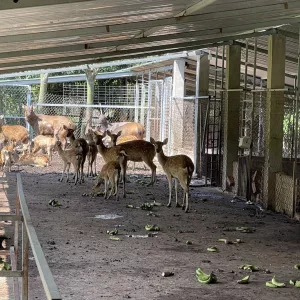Uncovering the risks of wild animal diseases in Southeast Asia
A One Health approach, coupled with community education and improved disease surveillance, can help to prevent future outbreaks of wild animal diseases in Southeast Asia, according to a recent research study published in Veterinary Quarterly (Mar 2025). The authors of the study reviewed a decade of published literature on wildlife zoonoses in Southeast Asia, a known hotspot for the emergence

Uncovering the risks of wild animal diseases in Southeast Asia
A One Health approach, coupled with community education and improved disease surveillance, can help to prevent future outbreaks of wild animal diseases in Southeast Asia, according to a recent research study published in Veterinary Quarterly (Mar 2025).
The authors of the study reviewed a decade of published literature on wildlife zoonoses in Southeast Asia, a known hotspot for the emergence of these diseases.
The publications reviewed were mainly on wildlife zoonotic diseases in Indonesia, Malaysia, Thailand and Vietnam.
The review uncovered a diverse range of potential disease-causing organisms and widespread occurrence of wild animal diseases.
Several factors play a role in the spread of these illnesses, putting communities at risk for infection.
These factors include habitat loss, environmental pollution, poor hygiene, lack of awareness, and interactions between people and animals.
Interventions
Consequently, to protect people from the risk of wild animal diseases, the researchers call for a number of interventions.
Countries should enhance surveillance of wildlife diseases, with a focus on animals with frequent human contact.
“It is also crucial that this surveillance extends to individuals in close proximity to animals to better understand spillover mechanisms and transmission drivers,” the study recommends.
Additionally, various community-level interventions can be implemented.
These include improving biosecurity and hygiene practices on farms and in the home, raising community awareness of health risks associated with wildlife meat products, and advocating for wildlife conservation to protect people from the risk of diseases from wild animals.
“These endeavors should embrace a One Health approach, facilitating collaboration among wildlife, veterinary, medical, and conservation sectors, as well as across health and social science disciplines,” the authors say, noting that a collaborative approach will ensure that the risk-mitigation efforts are practical and effective.
The CGIAR Initiative on One Health funded the study.
Citation
Ha Thi Thanh Nguyen, Lindahl, J.F., Bett, B., Hung Nguyen-Viet, Lam, S., Thang Nguyen-Tien, Unger, F., Sinh Dang-Xuan, Thanh Xuan Bui, Hien Thanh Le, Lundkvist, Å., Ling, J. and Hu Suk Lee. 2025. Understanding zoonotic pathogens and risk factors from wildlife in Southeast Asia: a systematic literature review. Veterinary Quarterly 45(1): 1–17.
Author affiliations
Chungnam National University, Ho Chi Minh Center for Diseases Control, Ho Chi Minh City University of Agriculture and Forestry, the International Livestock Research Institute, the Swedish Veterinary Agency and Uppsala University.
Photo: A wildlife farm in Dong Nai Province, Vietnam (ILRI/Ha Nguyen)

